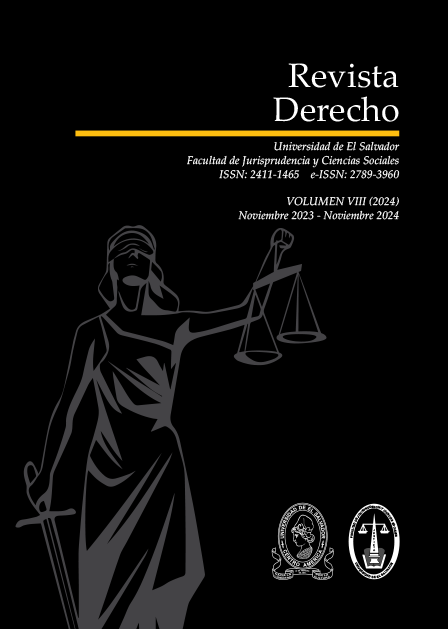Los desafíos del Derecho frente a la información cuántica: algunas perspectivas en torno al nuevo rol jurídico
Palabras clave:
derecho, computación cuántica, ética, inteligencia artificial, derechos fundamentalesResumen
Históricamente ante el advenimiento de la tecnología el ser humano ha demostrado que el cambio tecnológico ha impactado también en los términos del cambio social, económico y político; pero fundamentalmente afectando y reconfigurando las relaciones de poder. La computación cuántica aparece como uno de los más avanzados fenómenos que introducirá cambios en todos los órdenes de lo humano. La idea que subyace a la irrupción de la computación cuántica radica, como toda nueva herramienta tecnológica, en un desconcierto primario ante el poder que conlleva y la fuerza del surgimiento. Su procesamiento, adecuación y gobernanza requiere transformaciones de una manera precisa, pero también controlada. Es aquí donde una vez más el universo de las Ciencias Jurídicas debe plantear y adaptar las normas y valores jurídicos a estos fines, sin cercenar el desarrollo técnico, pero estableciendo principios ético-morales y de procedimiento. La combinación con otras tecnologías como la Inteligencia Artificial, nos depara aún, un mayor desafío en este ámbito. El objetivo de este artículo es intentar dar cuenta, ante qué tipo de desarrollo tecnológico emergente nos encontramos y desde qué directrices poder abordarlo, a los fines de su regulación, sin perder de vista la reconfiguración de las relaciones que esto supone, incluso en el ámbito jurídico.
Descargas
Referencias
Atik, Jeffery, “Quantum Computing and the Legal Imagination”. Loyola Law School, Los Angeles Legal Studies Research Paper No. 2022-03, 2022, 18 SciTech Lawyer 12 (2022). Disponible: https://ssrn.com/abstract=4087044
Atik Jeffery y Jeutner Valentin, “Quantum computing and computational law, Law, Innovation and Technology”. Taylor and Francis Online (2021). 13:2, 302-324, DOI:10.1080/175799 61.2021.1977216.
Filgueiras, Fernando. "Inteligencia Artificial en la administración pública: ambigüedad y elección de sistemas de IA y desafíos de gobernanza digital". Revista del CLAD Reforma y Democracia, núm. 79, 2021.
Hoofnagle, Chris Jay and Simson Garfinkel. Law and Policy for the Quantum Age (6 Enero, 2022). Cambridge University Press. Disponible: https://ssrn.com/abstract=4007638
Jeutner, Valentin. The Quantum Imperative: Addressing the Legal Dimension of Quantum Computers (5 Abril, 2021). (2021) 1 (1) Morals & Machines 52-59. Disponible: https://ssrn.com/abstract=3820003
Kop, Mauritz, Mateo Aboy, Eline De Jong, Urs Gasser, Timo Minssen, I. Glenn Cohen, Mark Brongersma, Teresa Quintel, Lusiano Floridi, Ray Laflamme, “Towards Responsible Quantum Technology”. Harvard Berkman Klein Center for Internet & Society Research Publication Series #2023-1 (March 17, 2023). https://ssrn.com/abstract=4393248
Kop, Mauritz and Mark Brongersma. “Integrating Bespoke IP Regimes for Quantum Technology into National Security Policy”. Social Science Research Network (8 Agosto, 2021). https://ssrn.com/abstract=4095763
Kop, Mauritz, “Establishing a Legal-Ethical Framework for Quantum Technology”. Yale Law School, Yale Journal of Law & Technology (YJoLT. (2021). https://yjolt.org/blog/establishinglegal-ethical-framework-quantum-technology.
Kop, Mauritz. “Quantum Computing and Intellectual Property Law”. Berkeley Technology Law Journal, Vol. 35, No. 3 (2021). https://ssrn.com/abstract=3860456
Perrier, Elija. “The quantum governance stack: Models of governance for quantum information technologies”. Digital Society, vol. 1, no 3 (2022): 22.
Foro Económico Mundial, Agenda de Davos: “El mundo camina hacia una "brecha cuántica”. (30 enero 2024). https://es.weforum.org/agenda/2023/01/el-mundo-camina-hacia-unabrecha-cuantica-por-que-es-preocupante/.
Informe Fundación Innovación Bankinter: Quantum Computing e Inte l i gencia Artificial: la revolución silenciosa. https://www.fundacionbankinter.org/wp-content/uploads/2023/03/Informe-FTF-Tecnologiascuanticas-y-IA-marzo23.pdf
Publicado
Número
Sección
Licencia
Derechos de autor 2024 Revista Derecho

Esta obra está bajo una licencia internacional Creative Commons Atribución-NoComercial 4.0.
Los autores ceden los derechos patrimoniales de autor en favor de la Facultad de Jurisprudencia y Ciencias Sociales de la Universidad de El Salvador (a través de Aequus Editorial), para incluir su escrito en Revista Derecho.








